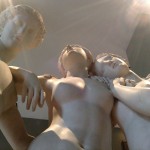I visited my beloved Three Graces in Paris one month ago today—got to the Louvre early enough to avoid lines and was outta there before noon. I targeted the Richelieu wing and followed the map through the palace’s grand hallways and airy courtyards to find my stone-cold beauties awaiting me in their salon among other French sculptures. But I had eyes only for them. And as I admired them, I was again in the head of my novel’s main character—born Mary Grace Klassen but now going by her self-adopted name of “Aglaia.”
This excerpt shows Mary Grace/Aglaia as she first met the Greek goddesses:
The life-sized Graces stood on a marble base so that Aglaia had to look up into them like a fourth party, a child approaching a trio of grown-ups who were companions of each other in an intimate alliance. They didn’t condemn or condone her intrusion; she was to them a specter, unseen and unheeded while their communion continued. The personification of grace, they were poised as if asking, “May I throw my spell around you, beautify you as I clothed the very gods?” Aglaia could sense their infinite waiting, triplets frozen in marble for all time, three persons chiseled from one substance. They were a tri-unity of personhood.
Aglaia wanted to lose herself in their lifelikeness, to wish them into reality. The pearly grey skin, bellies rounded and buttocks dimpled, dented under their mutual caresses. Did she see the throb of a vein in a neck, or a breast rise and fall? She almost smelled the heat of flesh. Could their noses smell, their tongues taste? She was nearly persuaded, but their eyes gave them away—sightless, flat, no markings of iris or pupil. Now that she studied them in the flesh, so to speak, she couldn’t differentiate them except by their props and their postures. The three faces could be one; there was little to set each goddess apart, and it perturbed her.
The Grace on the left peered downwards as if in expectation that a plant would sprout at any moment from the soil. She held a swag of flowers draped across her thigh and behind her derrière to wrap around one sister and up in an encompassing bond over the shoulder of the other, who stared out at eye level across the distance, the back of her hand pressed against the breast of the center figure, wrist softly bent.
But the middle Grace was the one that claimed Aglaia’s attention. The middle Grace stepped lightly on a jewelry box, like a victor claiming possession or a child at the beach sinking her toe in the sand. She held her chin high, gaze cast heavenward seeking the radiance of the sun or of her father, Zeus.
Aglaia knew her name—knew all their names, read many times since she first saw that postcard, murmured to herself on lonely nights. Thalia, on the left, was the goddess of the garden and all that flourished in nature’s abundance; she was given domain over the harvest and brought hearty nourishment to her sisters and all the gods. Euphrosyne, on the right, was the pleasure-giver, goddess of mirth and dance, the life of the party. But the middle Grace, Aglaia, was known as the most beautiful, the brightly shining one, the keeper of treasures.
Aglaia, her self-approved namesake and her idol.
Golden light flowed through the courtyard windows, bathing the Three Graces, coating their surface without breaking the barrier of their solidity or solidarity. Pradier had carved life onto them, told a story out of the marble and it was an enchanting story but incomplete, for he couldn’t breathe life into them. They were an unfinished covenant, a memorial. They were a tombstone like Lot’s wife, a pillar of salt languishing for the cities of destruction, blinded by the gods of their age as, perhaps, Mary Grace had been blinded.
For the first time since she was a teen, Aglaia began to second-guess her decision to change her name, her identity. She found herself inexplicably irritated by the marble statues, as lifeless as Pygmalion’s carving before its vivification, as Eve before hers. What had Aglaia, after all, expected from them throughout these years? Seeing the Three Graces in person, Aglaia felt the wind go out of herself. (THE THIRD GRACE, pages 187-189)



2 Comments